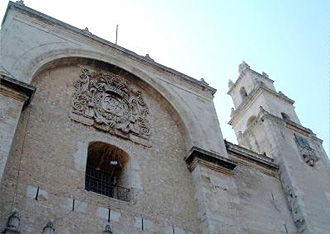In Merida, Searching for a Thanksgiving Day Turkey Made of Straw
 Ron Butler - American-Statesman Ron Butler - American-Statesman
go to original


| | The Catholic cathedral in Mérida, Yucatán, sits on the site of a former Mayan temple and was built with some of the temple's stones. (Brian J. Cantwell/Seattle Times) |
Mérida, Yucatán — I rarely travel anywhere these days without having the trip turn into a quest of some kind.

In Paris, I had to find a bottle of Bal de Versailles perfume for Alda. Had she told me what it cost, I wouldn't have looked so hard. In Mexico, the quest is usually of my own making. In Puebla, I went all over town looking for place mats that I finally found in Morelia, on another trip hundreds of miles away.

Now I'm in Mérida looking for little turkeys made of straw. I have a small army of relatives coming for Thanksgiving dinner and I thought they'd make ideal table favors that the guests could take home. I saw some here once and they stayed in my mind. Now, while everyone else is off visiting pre-Columbian ruins and trudging through the museums, I'm looking for turkeys.

I went first to Milo's Casa de Monedas, just off the zócalo, or main square. I was told it's the place to go for antiques, religious carvings, coins, stamps, pottery and dishware. But there were no turkeys.

Turkeys are a big deal in Mexico. In the United States, we tend to think of the turkey as our own, especially at this time of year, but Mexicans are equally possessive and rightly so. The Aztecs of Mexico were enjoying turkey feasts long before the Spanish conquistadors ever got the idea.

In most Latin American countries, the turkey is referred to by its Spanish name, pavo, but in Mexico it bears an Aztec name, guajolote, roughly derived from hueyxoletl, or "important personage."

Just as the turkey is the bird of choice on Thanksgiving Day here, turkey in mole sauce is frequently served on special occasions in Mexico, particularly at Christmas. Turkey mole is one of the world's oldest-known recipes. The Mayans ate it 9,000 years ago. Montezuma served it to Cortez and his bunch.

I learned all this while talking to my old friend Alberto Salum, who owns Alberto's Continental Restaurant on Calle 57, not far from the zócalo (everything in Mérida is close to the zocalo). The restaurant, housed in a 1727 hacienda, is filled with colonial paintings, santos (religious carvings), antique glazes, pottery pieces and rare silver.

Salum's grandparents came to Mexico from Syria. Menu specialties include multicourse Middle Eastern meals as well as regional specialties such as chicken tamales and fish Mayan style (snapper, sea bass or other local catches) served with rice and fried bananas. Salum told me that the native Mexican turkey is a hard-bitten, stringy-meated strutter that walks hundreds of miles in its lifetime — perhaps the last mile right into the kitchen. Despite its scrawny appearance, it's bursting with flavor.

Turkey is almost always served with mole to give it more zip. At Salum's, the turkey mole served on Monday is begun on Friday. It's pampered and prodded all weekend. Special ingredients are added, stirred and fused until, finally, on Monday, perfection.

The sauce is generally served over slices of roasted turkey, but, again, recipes change from village to village, chef to chef.

I eventually found my turkeys, of course. The body is plain straw-colored but the feathers and tail, also made of straw, are red and green. There's a little bell inside, so each turkey forms a kind of rattle. I could just see my guests ringing the bell when they wanted more cranberry sauce or creamed onions. I couldn't wait to get them home.

They cost about $1 each. I found them at a shop called Casa de las Artesanitas, at Calle 63 No. 503, not far from the zocalo.

Butler, of Tucson, is the author of 'Dancing Alone in Mexico' (University of Arizona Press, $17.95).

If you go...

Mérida, the capital of the Yucatán, is on a peninsula that separates the Caribbean from the Gulf of Mexico. The city of 700,000 is 20 miles inland.

Two new posh hotels include the 300-room Hyatt Regency (800-233-1234, $80-$185 per double) and the 350-room Fiesta Americana Mérida (800-343-782l, $150-$165 double).

If you're in the market for antiques, religious carvings, coins, stamps, pottery and dishware, head for Milo's Casa de Monedas at 498 63rd St., just off the zócalo.

The Mérida airport, four miles west of the city, is served by several airlines including Mexicana, American and Continental.

Mexican Tourist Board, (800) 446-3942

Yucatan.com, VisitMexico.com |



